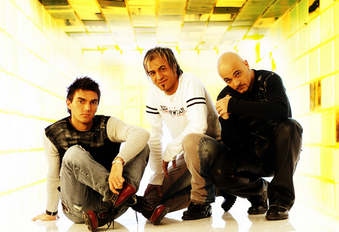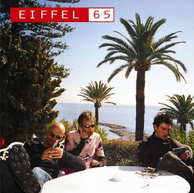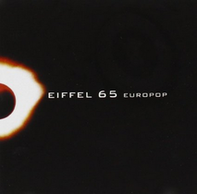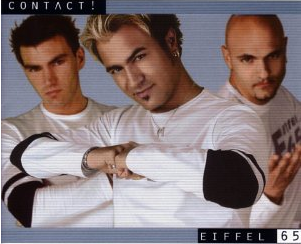Eiffel 65
(1998–2005, 2010–Present, Ages 10 and Up)
11/3/17
Sometime last year, I was on the phone with my father, who lives in Illinois. At one point our conversation turned to the ring tones he has on his phone for different callers. It was fun hearing what kind of tunes would ring out whenever family members like my sister, my brother, and my stepmother called him. But I felt very flattered when he told me that, upon hearing my Amethystium episode—I send him CD’s of my episodes every few months—he had programmed a song by that artist as a ring tone for general callers. When I asked him what song he had for whenever I called him, the answer he gave me brought back a lot of memories. The carefree days of Radio Disney, with their top 30 countdown every Sunday night. The boy in middle school who shared a mutual interest in them—and who was the first to ask if I’d be his girlfriend. And—on a mall trip with my dad, no less—the sheer elation I felt coming upon their second album completely by chance. (These were the days when my access to the internet was far more limited.) When I visited him again later, the subject came up again, and I asked him why he chose that song. He replied that he just as fondly remembered, when I was a kid, how excited I was about their music, and how I’d go on and on about them. Hopefully I didn’t totally talk his ear off back then—at least, no more than usual ;) Though I have still listened to these guys on and off again over the years, hearing them again with this conversation in mind really made me feel a sense of nostalgia that I haven’t had in a good while. Thanks, Dad.
Consisting of three members--Jeffrey Jey, Maurizio Lobina and Gabry Ponte—Eiffel 65 hails from Turin, Italy. If you grew up during the 90’s like I did, even if you don’t know them by name you’ll more than likely know their best-known song, “Blue (Da Ba Dee)”. Upon first hearing them, I mistakenly assumed that they were from France due to their band name, thinking that they had for some reason named themselves after the Eiffel Tower in Paris. (I wonder if I’m the only one who thought that.) And I couldn’t even begin to guess the reasoning behind “65”. But the name’s true conception is actually kind of a funny story: having been unable to decide on a name amongst themselves, the three guys simply gathered together words that they liked and put them into an Excel database; the program randomly chose the word “Eiffel”. The “65” part, however, was even more random. Their producer had been writing a phone number on a piece of paper at the exact time the label copy of “Blue” was on his desk; without thinking, we wrote two of those digits, 6 and 5, on the label copy. And then when the graphic artist got it, he assumed the number 65 was part of the name and put it at the end of “Eiffel”. And the rest, as they say, is history.
The more I listened to the Europop/Eurodance of Eiffel 65 during my early teen years, the more I realized there was something about their voices that I couldn’t quite put my finger on. They didn’t sound thoroughly computerized, but they didn’t sound quite natural either. I enjoyed the music for many years more, albeit feeling a bit puzzled each time, before I finally learned the source: Auto-Tune. Heavily influenced by Electronic artists like Daft Punk, the extensive use of this tool is the most prominent feature of Eiffel 65’s vocal sound. Released in 1999, “Blue” was in fact one of the earliest songs to use and popularize it. For those unfamiliar, Auto-Tune is an audio processor used to alter vocal and instrumental pitches in music, sometimes resulting in a more digitalized or “robotic” sound, whether for creative effect, or to simply disguise or correct any off-key inaccuracies. This latter function, unfortunately, is the underlying reason behind the negative reputation the tool has garnered over the years, as it is accused of making it easier for “bad” singers to make more music with less skill. However, Eiffel 65 has used it in a way that I think meshes very well with their instrumental style. Accompanying the rave-like synthesizers, the rapid tempo and precise beats of the percussion gives much of their music, especially the songs tailor-made for the dance floor, a very machine-like feel—clock-work, if you will—whether its lightens the step or pounds the pulse.
And speaking of technology, among the most common themes in their songs, especially in their earlier ones, is science, whether real science or science fiction. I can honestly think of no adjective more appropriate here than “nerdy”: sometimes in fun ways, sometimes in abstract ways, but seldom without a sense of rumination. And as a self-proclaimed nerd, I am ever all for that. :) The song, “My Console”, is a love letter to video games and the loyal fans who play them, a fond recollection of the original PlayStation and some of its most iconic titles:
P. L. A. Y. S. T. A. T. I. O. N
P. L. A. Y. S. T. A. T. I. O. N
P. L. A. Y. S. T. A. T. I. O. N
P. L. A. Y. S. T. A. T. I. O. N
We're gonna play the game the Playstation all day
With Metal Gear Solid to Tekken 3
And from Omega Boost to Resident Evil
Just play for the fun
Cos we got it going on
Ridge Racer
Odd World
Winning Eleven
The game on the Playstation
“Another Race” talks about—what else?—aliens, and how they are said to live invisibly among humans in a manner reminiscent of films like They Live or Invasion of the Body Snatchers; and I have to say, the weird little notes that pop up in between the chorus lyrics are a really nice touch, as if the creatures of the song are being “shown” to the listener through the music itself rather than told only through the words:
They seem to walk on air
And they act pretty strange
They live around us
But you can't recognize them
We can't communicate
With their one way brain
No matter how you try
You just won't understand them
It's another race from outer space
It's another race
It's another race from outer space
It's another race away, away
“Back in Time” explores the more surreal experiences of time travel, reminding me a bit of H.G. Wells’ The Time Machine, with the recklessly ambitious Time Traveler and his adventures in temporal Limbo:
Here in the open space where nothing
Seems to move at all
I can run this race back in time
From the world I can hide
Here in the open space where something
Seems to float and not fall
I can feel the madness slow down
I'm the master of time
Back in time
In my time, all the time
Up and down
Every time I'm flying
Back in time
In my time, one more time
Always up and down
All the time I'm flying (high)
And “People of Tomorrow” feels like a call to action of sorts, both encouraging the progress of the younger generations and prophesizing how they will change the world with the strengths and wonders of the technology they are sure to create:
Today, you're walkin' off to school
With your Game Boy
But tomorrow, you will lead the way
Computer kid
Born in the world of PC
Communications
And the world is what you are and to become
People of tomorrow
Na-na-na, na-na-na, na-na-na-na-na
CPU Generation
You are the nation
You are the future world
Now, these songs may certainly be less straightforward than I give credit for, with other meanings that I simply don’t see. More to the point, this isn’t to say these guys’ music is superficial, nor is it incapable of making one think. While the lyrics themselves may not always be as poetic or uncanny as, say, those of Owl City, whatever the songs may lack in profound topics or creative lines, they make up for in fresh metaphors—and by fresh metaphors, I mean those that are not utilized either often, if at all, in this particular genre, or in ways that just boil down to parties and sex. In fact, I’m glad that many Eiffel 65 songs don’t feature romantic love as a subject, choosing instead more than once to focus on the emotions and ideas of the individual mind, some more interpretable than others (and again these are my own thoughts). “Living in a Bubble” warns of the dangers of indulging too much in dreams, as otherwise, real life will eventually come crashing down on the dreamer:
We live in a bubble, baby
A bubble's no reality
You've got to have a look outside
Nothing in the bubble is the way it's supposed to be
And when it blows, you'll hit the ground
Live in a bubble, baby
But it's not the place to be
'Cause it's a place of lies and hype
Don't believe the bubble 'cause it's nothin' but a dream
And when it blows, you'll be alone
Oh yeah
and “Morning Time” speaks to me of how death might feel like a new adventure to one dying of natural causes:
Morning time
I sit and watch the sun arise
And everything seems so different now
Than it was just before
Dawning sun
As you go down, my soul will run
I feel it all slip away
Slip out of my hands
I realize as I see all the people holdin' tight
As I leave the world tonight, yeah
Meetin' the light
I realize as I see all the people holdin' tight
As I leave the world tonight, yeah
Meetin' the light
But the messages of “Johnny Grey” and “Elephants in Amsterdam”, if they exist, are beyond me. (To make another Owl City comparison, the latter’s particularly weird lyrics do sound like the kind Adam Young would conjure up, don’t you think?)
My name is Johnny Grey
It's just a name
For you, it's the same
The world I know seems not to know me
Here's my number, I need a call
Excuse me, it's Johnny Grey
Not Tommy Day
My name's Johnny Grey
I can't remember my phone number
All the calls I get are mistakes
And I holler and make no noise
As I said before
My name is Johnny Grey
______________
I'm so close
But yet far
I feel tonight
From outside
I'm leaving, I'm gone
I need to know myself once again
Sadly from the phone
I feel I should be dancing with the elephants
I'm dancing with the elephants in Amsterdam
I'm dancing like the elephants in Amsterdam
I'm looking for the elephants in Amsterdam
Dancing with the elephants
I'm dancing with the elephants in Amsterdam
I'm dancing like an elephant in Amsterdam
I'm looking for my elephant in Amsterdam
This group has long since been deemed a one-hit wonder. (And the incredibly dated-looking CGI in their hit song’s music video hasn’t helped to change that.) But in my opinion, a one-hit wonder just means that people simply best remember that one song they made, that doesn’t mean that every other song of theirs is bad. If nothing else, Eiffel 65 is an Electronic nostalgia trip for both fans of dance and those who just like to dance. Heck, maybe in another few decades or so my generation will recognize their timelessness and be reminiscing about them—and artists like them—the way our parents and grandparents do now about Frank Sinatra, the Beatles, and the like. Who knows? ;)
CREDITS:
All images, audio, and links belong to their respective owners; no copyright infringement is intended.
MAIN THEME:
“The Call” - Briand Morrison and Roxann Berglund
Consisting of three members--Jeffrey Jey, Maurizio Lobina and Gabry Ponte—Eiffel 65 hails from Turin, Italy. If you grew up during the 90’s like I did, even if you don’t know them by name you’ll more than likely know their best-known song, “Blue (Da Ba Dee)”. Upon first hearing them, I mistakenly assumed that they were from France due to their band name, thinking that they had for some reason named themselves after the Eiffel Tower in Paris. (I wonder if I’m the only one who thought that.) And I couldn’t even begin to guess the reasoning behind “65”. But the name’s true conception is actually kind of a funny story: having been unable to decide on a name amongst themselves, the three guys simply gathered together words that they liked and put them into an Excel database; the program randomly chose the word “Eiffel”. The “65” part, however, was even more random. Their producer had been writing a phone number on a piece of paper at the exact time the label copy of “Blue” was on his desk; without thinking, we wrote two of those digits, 6 and 5, on the label copy. And then when the graphic artist got it, he assumed the number 65 was part of the name and put it at the end of “Eiffel”. And the rest, as they say, is history.
The more I listened to the Europop/Eurodance of Eiffel 65 during my early teen years, the more I realized there was something about their voices that I couldn’t quite put my finger on. They didn’t sound thoroughly computerized, but they didn’t sound quite natural either. I enjoyed the music for many years more, albeit feeling a bit puzzled each time, before I finally learned the source: Auto-Tune. Heavily influenced by Electronic artists like Daft Punk, the extensive use of this tool is the most prominent feature of Eiffel 65’s vocal sound. Released in 1999, “Blue” was in fact one of the earliest songs to use and popularize it. For those unfamiliar, Auto-Tune is an audio processor used to alter vocal and instrumental pitches in music, sometimes resulting in a more digitalized or “robotic” sound, whether for creative effect, or to simply disguise or correct any off-key inaccuracies. This latter function, unfortunately, is the underlying reason behind the negative reputation the tool has garnered over the years, as it is accused of making it easier for “bad” singers to make more music with less skill. However, Eiffel 65 has used it in a way that I think meshes very well with their instrumental style. Accompanying the rave-like synthesizers, the rapid tempo and precise beats of the percussion gives much of their music, especially the songs tailor-made for the dance floor, a very machine-like feel—clock-work, if you will—whether its lightens the step or pounds the pulse.
And speaking of technology, among the most common themes in their songs, especially in their earlier ones, is science, whether real science or science fiction. I can honestly think of no adjective more appropriate here than “nerdy”: sometimes in fun ways, sometimes in abstract ways, but seldom without a sense of rumination. And as a self-proclaimed nerd, I am ever all for that. :) The song, “My Console”, is a love letter to video games and the loyal fans who play them, a fond recollection of the original PlayStation and some of its most iconic titles:
P. L. A. Y. S. T. A. T. I. O. N
P. L. A. Y. S. T. A. T. I. O. N
P. L. A. Y. S. T. A. T. I. O. N
P. L. A. Y. S. T. A. T. I. O. N
We're gonna play the game the Playstation all day
With Metal Gear Solid to Tekken 3
And from Omega Boost to Resident Evil
Just play for the fun
Cos we got it going on
Ridge Racer
Odd World
Winning Eleven
The game on the Playstation
“Another Race” talks about—what else?—aliens, and how they are said to live invisibly among humans in a manner reminiscent of films like They Live or Invasion of the Body Snatchers; and I have to say, the weird little notes that pop up in between the chorus lyrics are a really nice touch, as if the creatures of the song are being “shown” to the listener through the music itself rather than told only through the words:
They seem to walk on air
And they act pretty strange
They live around us
But you can't recognize them
We can't communicate
With their one way brain
No matter how you try
You just won't understand them
It's another race from outer space
It's another race
It's another race from outer space
It's another race away, away
“Back in Time” explores the more surreal experiences of time travel, reminding me a bit of H.G. Wells’ The Time Machine, with the recklessly ambitious Time Traveler and his adventures in temporal Limbo:
Here in the open space where nothing
Seems to move at all
I can run this race back in time
From the world I can hide
Here in the open space where something
Seems to float and not fall
I can feel the madness slow down
I'm the master of time
Back in time
In my time, all the time
Up and down
Every time I'm flying
Back in time
In my time, one more time
Always up and down
All the time I'm flying (high)
And “People of Tomorrow” feels like a call to action of sorts, both encouraging the progress of the younger generations and prophesizing how they will change the world with the strengths and wonders of the technology they are sure to create:
Today, you're walkin' off to school
With your Game Boy
But tomorrow, you will lead the way
Computer kid
Born in the world of PC
Communications
And the world is what you are and to become
People of tomorrow
Na-na-na, na-na-na, na-na-na-na-na
CPU Generation
You are the nation
You are the future world
Now, these songs may certainly be less straightforward than I give credit for, with other meanings that I simply don’t see. More to the point, this isn’t to say these guys’ music is superficial, nor is it incapable of making one think. While the lyrics themselves may not always be as poetic or uncanny as, say, those of Owl City, whatever the songs may lack in profound topics or creative lines, they make up for in fresh metaphors—and by fresh metaphors, I mean those that are not utilized either often, if at all, in this particular genre, or in ways that just boil down to parties and sex. In fact, I’m glad that many Eiffel 65 songs don’t feature romantic love as a subject, choosing instead more than once to focus on the emotions and ideas of the individual mind, some more interpretable than others (and again these are my own thoughts). “Living in a Bubble” warns of the dangers of indulging too much in dreams, as otherwise, real life will eventually come crashing down on the dreamer:
We live in a bubble, baby
A bubble's no reality
You've got to have a look outside
Nothing in the bubble is the way it's supposed to be
And when it blows, you'll hit the ground
Live in a bubble, baby
But it's not the place to be
'Cause it's a place of lies and hype
Don't believe the bubble 'cause it's nothin' but a dream
And when it blows, you'll be alone
Oh yeah
and “Morning Time” speaks to me of how death might feel like a new adventure to one dying of natural causes:
Morning time
I sit and watch the sun arise
And everything seems so different now
Than it was just before
Dawning sun
As you go down, my soul will run
I feel it all slip away
Slip out of my hands
I realize as I see all the people holdin' tight
As I leave the world tonight, yeah
Meetin' the light
I realize as I see all the people holdin' tight
As I leave the world tonight, yeah
Meetin' the light
But the messages of “Johnny Grey” and “Elephants in Amsterdam”, if they exist, are beyond me. (To make another Owl City comparison, the latter’s particularly weird lyrics do sound like the kind Adam Young would conjure up, don’t you think?)
My name is Johnny Grey
It's just a name
For you, it's the same
The world I know seems not to know me
Here's my number, I need a call
Excuse me, it's Johnny Grey
Not Tommy Day
My name's Johnny Grey
I can't remember my phone number
All the calls I get are mistakes
And I holler and make no noise
As I said before
My name is Johnny Grey
______________
I'm so close
But yet far
I feel tonight
From outside
I'm leaving, I'm gone
I need to know myself once again
Sadly from the phone
I feel I should be dancing with the elephants
I'm dancing with the elephants in Amsterdam
I'm dancing like the elephants in Amsterdam
I'm looking for the elephants in Amsterdam
Dancing with the elephants
I'm dancing with the elephants in Amsterdam
I'm dancing like an elephant in Amsterdam
I'm looking for my elephant in Amsterdam
This group has long since been deemed a one-hit wonder. (And the incredibly dated-looking CGI in their hit song’s music video hasn’t helped to change that.) But in my opinion, a one-hit wonder just means that people simply best remember that one song they made, that doesn’t mean that every other song of theirs is bad. If nothing else, Eiffel 65 is an Electronic nostalgia trip for both fans of dance and those who just like to dance. Heck, maybe in another few decades or so my generation will recognize their timelessness and be reminiscing about them—and artists like them—the way our parents and grandparents do now about Frank Sinatra, the Beatles, and the like. Who knows? ;)
CREDITS:
All images, audio, and links belong to their respective owners; no copyright infringement is intended.
MAIN THEME:
“The Call” - Briand Morrison and Roxann Berglund
All other tracks are by Eiffel 65:
“Blue (Da Ba Dee)” (from Europop [1999])
“80s Stars” (bonus track from Contact! [2001])
“Europop” (from Europop [1999])
“My Console” (from Europop [1999])
“Another Race” (from Europop [1999])
“Back in Time” (from Contact! [2001])
“People of Tomorrow” (from Contact! [2001])
“Living in a Bubble” (from Europop [1999])
“Morning Time” (from Contact! [2001])
“Johnny Grey” (from Contact! [2001])
“Elephants in Amsterdam” (Non-album single [2002])
“Journey” (from Contact! [2001])
Download the full 15-minute episode here!
Eiffel 65 on Wikipedia
Eiffel 65's Official Website
Eiffel 65's Official YouTube Channel
Eiffel 65's Facebook Page
Eiffel 65's Twitter Page
Eiffel 65 on Tv Tropes
Buy Eiffel 65 on Billboard
Buy Eiffel 65 on Discogs
Buy Eiffel 65 on Apple Music
Buy Eiffel 65 on Amazon
Buy Eiffel 65 on Ebay
^^ Back to Music, Bands, and Other Creations of Sound
“Blue (Da Ba Dee)” (from Europop [1999])
“80s Stars” (bonus track from Contact! [2001])
“Europop” (from Europop [1999])
“My Console” (from Europop [1999])
“Another Race” (from Europop [1999])
“Back in Time” (from Contact! [2001])
“People of Tomorrow” (from Contact! [2001])
“Living in a Bubble” (from Europop [1999])
“Morning Time” (from Contact! [2001])
“Johnny Grey” (from Contact! [2001])
“Elephants in Amsterdam” (Non-album single [2002])
“Journey” (from Contact! [2001])
Download the full 15-minute episode here!
Eiffel 65 on Wikipedia
Eiffel 65's Official Website
Eiffel 65's Official YouTube Channel
Eiffel 65's Facebook Page
Eiffel 65's Twitter Page
Eiffel 65 on Tv Tropes
Buy Eiffel 65 on Billboard
Buy Eiffel 65 on Discogs
Buy Eiffel 65 on Apple Music
Buy Eiffel 65 on Amazon
Buy Eiffel 65 on Ebay
^^ Back to Music, Bands, and Other Creations of Sound



